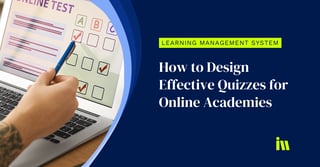
Designing online quizzes and exams is more than just a method of evaluation—it's an art that can enhance learning, engagement, and retention. With the rise of online academies, creating effective assessments is crucial for ensuring that students not only absorb the material but also enjoy the learning process. Here are some strategies to consider when designing your quizzes and exams, focusing on what you can achieve with your LMS tool.
1. Diversify Question Types
While multiple-choice questions are a staple in online quizzes, diversifying the types of questions can significantly enhance engagement and understanding. Incorporate the following:
- Scenario-Based Questions: Present students with real-world scenarios related to the course material and ask them to choose the best course of action. This helps in applying theoretical knowledge practically.
- Reflection Questions: Encourage students to reflect on what they've learned by including open-ended questions that require them to explain concepts in their own words.
2. Pre-Quiz Interactive Content
Enhance the beginning of your quiz with engaging content to set the stage for students:
- Video Introductions: Start the quiz with a short video summarizing the key concepts that will be covered. This primes students for the questions ahead.
- Interactive Diagrams: Provide an interactive diagram or simulation at the beginning of the quiz to help students visualize the concepts they will be tested on.
3. Provide Immediate Feedback
One of the advantages of online quizzes is the ability to provide instant feedback. Instead of just telling students whether they are right or wrong, provide detailed explanations for the correct answers. This helps reinforce learning and ensures that students understand why an answer is correct.
4. Balance Between Difficulty Levels
Ensure that your quizzes have a balanced mix of easy, moderate, and challenging questions. This approach prevents frustration from overly difficult quizzes and boredom from quizzes that are too easy. A balanced difficulty level helps maintain student engagement and provides a more accurate assessment of their understanding.
5. Encourage Collaboration
Traditional quizzes are often solitary activities, but online platforms offer the opportunity for collaborative learning. Design some quizzes as group activities where students can work together to find answers. This can enhance their understanding through discussion and collaborative problem-solving.
6. Focus on Practical Application
Especially for higher education and professional training, emphasize practical application over rote memorization. Design questions that require students to apply what they've learned in real-world scenarios. This not only tests their understanding but also prepares them for practical use of their knowledge.
7. Use Quiz-Level Analytics
Leverage quiz-level analytics to gain valuable insights. Track overall performance trends to identify areas where students may be struggling. Use this data to adjust your teaching methods and provide additional resources on challenging topics.
8. Implement Badge Systems
Create a rewarding experience by setting up a system to assign badges to users based on their performance. Use your CRM module for CMS or connect HubDB to a website page to display these badges. Recognizing achievements can motivate students and encourage continued engagement with the course material.
9. Regularly Update Content
To keep your quizzes relevant and engaging, regularly update the content to reflect the latest information and trends in your field. This can also involve including current events or recent developments related to the course material, which makes the learning experience more dynamic and relevant.
10. Analyze and Iterate
Use the available analytics to track the performance of your quizzes. Look for patterns in the data, such as questions that a majority of students get wrong, and adjust accordingly. This iterative process ensures that your quizzes remain effective and challenging.
Leveraging Learn LMS for Interactive Learning Experiences
Our Learn LMS tool is designed to facilitate the creation of engaging and effective quizzes. Customers have found Learn LMS to be incredibly user-friendly, allowing them to build compelling content with ease. The intuitive interface makes it straightforward to create quizzes and exams that are both challenging and engaging.
Moreover, Learn LMS supports regular content updates, enabling educators to keep their material fresh and relevant. This flexibility ensures that students are always engaged with the most current and applicable information. By using Learn LMS, educators can provide an interactive and dynamic learning experience that enhances student engagement and retention.
For a thorough review of Learn LMS and other options in the marketplace, be sure to check out our comprehensive LMS comparison guide.
Start Building Your Online Academy Today
Designing effective online quizzes and exams is a dynamic process that involves creativity, analysis, and a deep understanding of your students' needs. By incorporating diverse question types, leveraging pre-quiz interactive content, providing immediate feedback, and focusing on practical application, you can create assessments that not only evaluate but also enhance learning. Regular updates and analysis ensure that your quizzes remain relevant and effective, contributing to a rich and engaging online learning experience.

